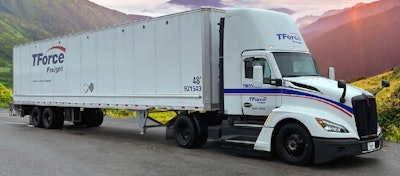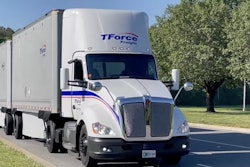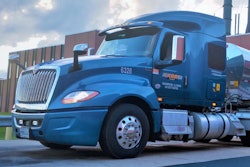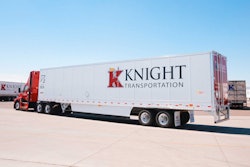
TFI International, the largest trucking company in Canada, won't hold that title for much longer – at least not on paper.
TFI Chairman, President and Chief Executive Officer Alain Bédard said Thursday the company's plan to re-domicile the company from Canada to the U.S. represents an "evolution of TFI."
Founded in 1957 as a regional trucking service, TFI (CCJ Top 250, No. 5) has made 137 acquisitions in the U.S, Canada and Mexico since 2008 – none larger than flatbed giant Daseke in 2023 and UPS Freight in 2021. That growth has unbalanced the company's footprint from where the now international fleet currently calls home.
Approximately 70% of TFI’s business is now U.S. domestic with 25% Canadian and the balance being transborder, and almost half of the company's shareholders are in the U.S.
"Five years ago," Bédard said, "we had no U.S. shareholders. Today, just under 50% – 49.9% – of shareholders as the summer of 2024, were U.S., and 45% were Canadian."
The growth of U.S. shareholders is at least part of what has prompted TFI's need to relocate. TFI, which has traded on the New York Stock Exchange since February 2020, is on the brink of crossing 50% U.S.-based ownership, which triggers more challenging financial reporting for publicly-traded foreign owned companies.
The move itself, which still needs shareholder approval, is little more than a paperwork exercise. The company will not de-list from the Toronto Stock Exchange and Bédard said office personnel currently located in Canada would not be relocated.
"If you look at TFI today, we have people working in Canada. We have also people working in the U.S.... We are all over the place in North America with our head office crew," he said. "Every member of the TFI head office is staying where they're at."
The formal move south, however, shines a spotlight on TFI's U.S. LTL market, where Bédard said costs and claims are higher, and density isn't as strong for the company as it is in Canada.
"In the U.S., our costs are not good because our density is way too low," he said, adding the company handles 10,000 shipments a day in Canada versus 20,000 in the U.S., and is driving too far to move too little tonnage. "If you want to be a national player in the U.S., [20,000 shipments] is too small. We do 10,000 in Canada and Canada is one-tenth the size."
Once the move is complete, TFI International will become a U.S. corporation, which eases working with U.S. government contracts, specifically Department of Defense contracts within TFI's Daseke division.
"The U.S. is the best place in the world to be in terms of business," Bédard said, expressing his confidence in the Trump administration and reiterating his plans to further invest in his company, most of it in the U.S.
"We said at one point we're going to invest $3 billion to $4 billion," he said. "It's going to be in the U.S. It's not going to be in Canada. I feel really good about this U.S. economy and I feel the new administration will do a great job. To me, it's time to invest in the U.S."
Bédard did not disclose what city he intends to make TFI's new U.S. headquarters. Daseke was headquartered in Addison, Texas, and UPS Freight, now T Force Freight, is headquartered in Virginia.












